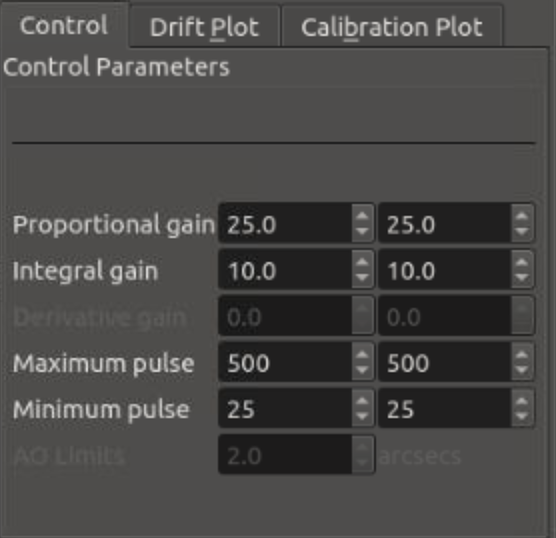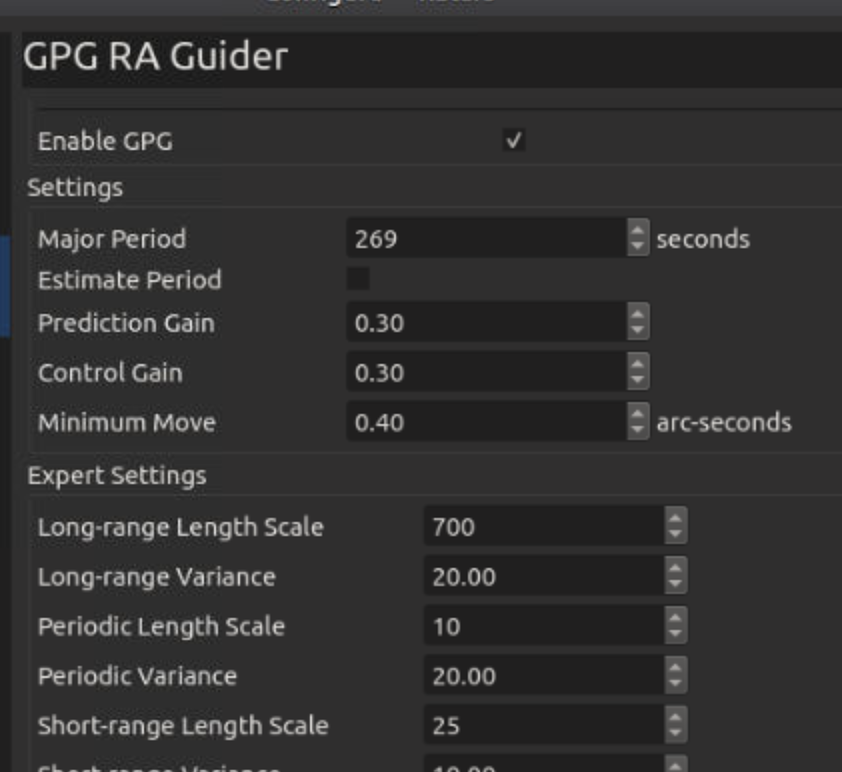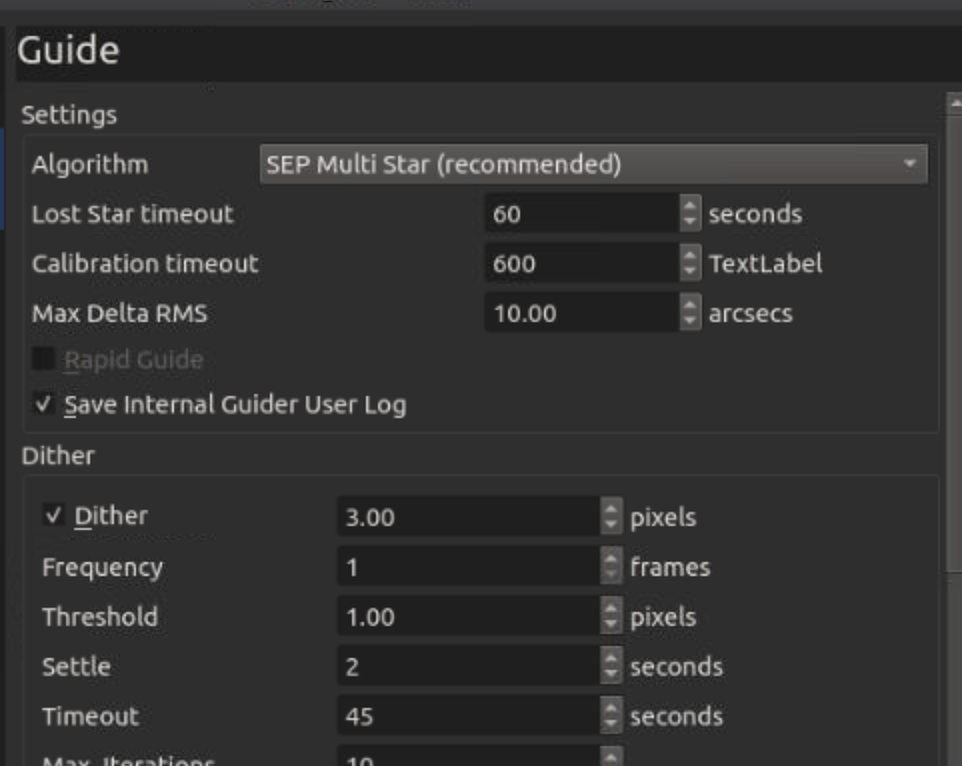×
INDI Library v2.0.7 is Released (01 Apr 2024)
Bi-monthly release with minor bug fixes and improvements
Guiding a Paramount MyT (internal guider)
- Scott Denning
-
 Topic Author
Topic Author
- Offline
- Elite Member
-

- Posts: 300
- Thank you received: 57
Guiding a Paramount MyT (internal guider) was created by Scott Denning
I'm having a lot of trouble guiding my Paramount MyT with the internal guider.
My results (rms, eccentricity) are substantially worse than unguided, so I suspect that I'm overcorrecting. My polar alignment is dead-on, and I can do 10-minute unguided exposures, but I hope to be able to tighten up the stars a bit.
I realize that Hy has recently implemented a bunch of wonderful new features, and I've been very successful guiding my iOptron CEM40. But I can't find documentation on some of the new parameters, which I want to adjust to make the guiding less aggressive. I'm especially interested in better understanding the following parameters:
Prediction Gain
Control Gain
Proportional Gain
Integral Gain
Are some of these in pixels and others in percentages (or fractions)? Does anybody have any idea of how far to back off these numbers if I just want a light touch of guide pulses every ten seconds or so to eliminate drift?
Screenshots attached.
Thank you!
Scott
My results (rms, eccentricity) are substantially worse than unguided, so I suspect that I'm overcorrecting. My polar alignment is dead-on, and I can do 10-minute unguided exposures, but I hope to be able to tighten up the stars a bit.
I realize that Hy has recently implemented a bunch of wonderful new features, and I've been very successful guiding my iOptron CEM40. But I can't find documentation on some of the new parameters, which I want to adjust to make the guiding less aggressive. I'm especially interested in better understanding the following parameters:
Prediction Gain
Control Gain
Proportional Gain
Integral Gain
Are some of these in pixels and others in percentages (or fractions)? Does anybody have any idea of how far to back off these numbers if I just want a light touch of guide pulses every ten seconds or so to eliminate drift?
Screenshots attached.
Thank you!
Scott
3 years 6 months ago
#60949
Please Log in or Create an account to join the conversation.
- Hy Murveit
-

- Offline
- Administrator
-

- Posts: 1222
- Thank you received: 565
Replied by Hy Murveit on topic Guiding a Paramount MyT (internal guider)
Scott,
First off, yes, there is a kstars handbook at:
docs.kde.org/trunk5/en/extragear-edu/kst...ekos.html#ekos-guide
but I have not updated it (my bad--sorry, wasn't really thinking about it) in any of my guider changes.
I did update it for Analyze, due to feedback from Jasem, but unfortunately, I those changes
can't be pushed to the online manual until something I don't understand gets fixed.
Hopefully that will happen soon, and we can make the manual a better reference for the current kstars UI.
So, here's a plug for "if you (anyone out there) have the time, please help with the documentation!"
It would be great if, once you figured all this out, you improved the KStars manual.
Here are my answers to your specific questions.
For all of the GPG parameters, until we get this in the manual, please see the PHD2 documentation for Predictive PEC
openphdguiding.org/man-dev/Guide_algorithms.htm
I also tried to put 'mouse-over' hints in the GPG options window.
You probably shouldn't change any of the Expert parameters (anyway, I don't fully understand them).
The most important GPG ones are:
- Enable (obvious),
- Period (look it up for your mount, and then uncheck estimate period, or alternatively if you're adventurous, run it with estimate period checked for an hour or two, and assuming you like the RA guiding during the last half of the interval, keep the period value it found and uncheck estimate period).
- Control Gain: the GPG guider at the start uses a simple control mechanism (the pulse tries to correct the error). Control gain of 0.5 means "try to fix half of the error". Setting it 1.0 would likely result in an overcorrected system with poor guiding, so 0.5 is pretty normal.
- Prediction Gain: Similar, but instead of error, now it has started making predictions of how to fix the error (based on the error and based on its periodic error estimate).
I think that things should go well with Control and Prediction gains around their defaults (in the 0.5 neighborhood). If you're having major issues, I think if you use defaults, something else is to blame. The only exception would be if you have a bad major period value. You do need to let GPG settle for a few periods, though, before passing judgement.
You can make the GPG guiding less aggressive by reducing control gain and prediction gain.
Please note that GPG only controls RA.
With respect to the parameters from the 'standard' (not the GPG) internal guider.
If you're not familiar with control theory, there's something called a PID guider. Stands for Proportional, Integral, Derivative control.
- Proportional means make corrections based on the error (e.g. you're off by 1 pixel in one direction, put the mount a certain amount in the other direction, and that amount is "control" times the error).
- Integral means look at the recent history of error (e.g. the average error in the past N samples) and make adjustments based on that. KStars defaults to not using that (e.g. the integral gain is 0). I haven't been able to make my guiding better by using that.
- Derivative isn't implemented in KStars. (It looks at the rate that the system is approaching the target--I guess in an attempt to prevent overshoot).
If you're using GPG, the above 2 (Proportional & Integral) aren't used for RA, but rather the GPG settings.
Whether or not you're using GPG, DEC is controlled by Proportional and Integral.
The other setting that might be applicable is min move (don't react to errors less that XXX--but really min move is in units of pulse ms, so it's don't put out a shorter correction pulse than XXX) and Max (don't put out a pulse greater than XXX.
The other important setting, of course, is the guide exposure, which controls how often guiding is done.
So, if you want to be less aggressive, perhaps make the guide exposure pretty long (e.g. 3 or 4 or 5s), and perhaps turn down the control gain, and perhaps increase the min move. If you suspect that you don't have much periodic error (and sounds like you don't since you can track well without guiding) you should consider NOT using GPG.
You likely know most of this, but just in case...
Hy
First off, yes, there is a kstars handbook at:
docs.kde.org/trunk5/en/extragear-edu/kst...ekos.html#ekos-guide
but I have not updated it (my bad--sorry, wasn't really thinking about it) in any of my guider changes.
I did update it for Analyze, due to feedback from Jasem, but unfortunately, I those changes
can't be pushed to the online manual until something I don't understand gets fixed.
Hopefully that will happen soon, and we can make the manual a better reference for the current kstars UI.
So, here's a plug for "if you (anyone out there) have the time, please help with the documentation!"
It would be great if, once you figured all this out, you improved the KStars manual.
Here are my answers to your specific questions.
For all of the GPG parameters, until we get this in the manual, please see the PHD2 documentation for Predictive PEC
openphdguiding.org/man-dev/Guide_algorithms.htm
I also tried to put 'mouse-over' hints in the GPG options window.
You probably shouldn't change any of the Expert parameters (anyway, I don't fully understand them).
The most important GPG ones are:
- Enable (obvious),
- Period (look it up for your mount, and then uncheck estimate period, or alternatively if you're adventurous, run it with estimate period checked for an hour or two, and assuming you like the RA guiding during the last half of the interval, keep the period value it found and uncheck estimate period).
- Control Gain: the GPG guider at the start uses a simple control mechanism (the pulse tries to correct the error). Control gain of 0.5 means "try to fix half of the error". Setting it 1.0 would likely result in an overcorrected system with poor guiding, so 0.5 is pretty normal.
- Prediction Gain: Similar, but instead of error, now it has started making predictions of how to fix the error (based on the error and based on its periodic error estimate).
I think that things should go well with Control and Prediction gains around their defaults (in the 0.5 neighborhood). If you're having major issues, I think if you use defaults, something else is to blame. The only exception would be if you have a bad major period value. You do need to let GPG settle for a few periods, though, before passing judgement.
You can make the GPG guiding less aggressive by reducing control gain and prediction gain.
Please note that GPG only controls RA.
With respect to the parameters from the 'standard' (not the GPG) internal guider.
If you're not familiar with control theory, there's something called a PID guider. Stands for Proportional, Integral, Derivative control.
- Proportional means make corrections based on the error (e.g. you're off by 1 pixel in one direction, put the mount a certain amount in the other direction, and that amount is "control" times the error).
- Integral means look at the recent history of error (e.g. the average error in the past N samples) and make adjustments based on that. KStars defaults to not using that (e.g. the integral gain is 0). I haven't been able to make my guiding better by using that.
- Derivative isn't implemented in KStars. (It looks at the rate that the system is approaching the target--I guess in an attempt to prevent overshoot).
If you're using GPG, the above 2 (Proportional & Integral) aren't used for RA, but rather the GPG settings.
Whether or not you're using GPG, DEC is controlled by Proportional and Integral.
The other setting that might be applicable is min move (don't react to errors less that XXX--but really min move is in units of pulse ms, so it's don't put out a shorter correction pulse than XXX) and Max (don't put out a pulse greater than XXX.
The other important setting, of course, is the guide exposure, which controls how often guiding is done.
So, if you want to be less aggressive, perhaps make the guide exposure pretty long (e.g. 3 or 4 or 5s), and perhaps turn down the control gain, and perhaps increase the min move. If you suspect that you don't have much periodic error (and sounds like you don't since you can track well without guiding) you should consider NOT using GPG.
You likely know most of this, but just in case...
Hy
The following user(s) said Thank You: Scott Denning
3 years 6 months ago
#60983
Please Log in or Create an account to join the conversation.
- Jose Corazon
-

- Offline
- Supernova Explorer
-

- Posts: 1119
- Thank you received: 182
Replied by Jose Corazon on topic Guiding a Paramount MyT (internal guider)
I thought Integral Gain was not being calculated at all. Has that changed over the last 6 months or so or am I mixing this up with something else?
Jo
indilib.org/forum/general/7225-guiding-settings.html#56007
Jo
indilib.org/forum/general/7225-guiding-settings.html#56007
Please Log in or Create an account to join the conversation.
- Hy Murveit
-

- Offline
- Administrator
-

- Posts: 1222
- Thank you received: 565
Replied by Hy Murveit on topic Guiding a Paramount MyT (internal guider)
From looking at the code it seems to me that an integrated error term is implemented.
invent.kde.org/education/kstars/-/blob/m...uide/gmath.cpp#L1033
As I said, I don't use it (my "integral gain" values are 0.0) but it looks to me like it should compute.
Do you have experience otherwise?
Hy
invent.kde.org/education/kstars/-/blob/m...uide/gmath.cpp#L1033
As I said, I don't use it (my "integral gain" values are 0.0) but it looks to me like it should compute.
Do you have experience otherwise?
Hy
3 years 6 months ago
#60987
Please Log in or Create an account to join the conversation.
- Jose Corazon
-

- Offline
- Supernova Explorer
-

- Posts: 1119
- Thank you received: 182
Replied by Jose Corazon on topic Guiding a Paramount MyT (internal guider)
Referring to what Jasem wrote about half a year ago: indilib.org/forum/ekos/6462-internal-aut....html?start=12#50239
3 years 6 months ago
#60988
Please Log in or Create an account to join the conversation.
Time to create page: 0.170 seconds
© 2003-2022 by INDI Library. All rights reserved.




